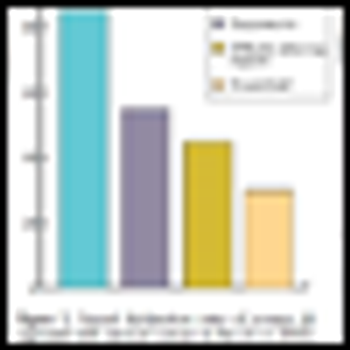
Community Oncology Alliance calls for action; cuts in cancer care reimbursement would have devastating impact on community practices

Your AI-Trained Oncology Knowledge Connection!


Community Oncology Alliance calls for action; cuts in cancer care reimbursement would have devastating impact on community practices

Results from ToGA trial also raise questions about treatment costs and how to determine which patients will benefit from trastuzumab addition.

In these patients with substantial symptoms and short life expectancy, there's no reason to delay delivery of palliative care.

Learn About Chronic ITP In the first of a series of video presentation, Dr. Lou Aledort introduces an informative presentation on Nplate® for use in patients with chronic ITP. Learn how Nplate® mimics the body's natural process of platelet production in patients with ITP.

Radiation doses to the heart of about 5 Gy or greater in childhood are associated with long-term cardiovascular consequences, including early mortality. Cancer care specialists strive to balance late-stage effects without sacrificing treatment benefits.

The search for a magic bullet against cancer historically has glowed bright then dimmed, depending on the stage of discovery. Developments surrounding monoclonal antibodies and angiogenesis inhibitors have followed this cycle, as exuberance for their potential has bowed to the nuances that underlie the complex mechanisms on which they depend.

The 5-year survival rate of cancer patients in the United States is about 66%, and today there are approximately 12 million cancer survivors in the US.

Mindfulness meditation and other mindfulness-based practices are gaining popularity due to a burgeoning evidence base supporting its benefits for a broad range of conditions and populations, including cancer patients[1] and healthcare professionals.

Current advances in the field of medicine have aided in the early detection and treatment of cancer, leading to an increased rate of survivorship among cancer patients after an initial diagnosis.

Advances in Breast Imaging In accordance with National Breast Cancer Awareness Month, ONCOLOGY spoke with Pam Benkert, Vice President and General Manager of Philips Healthcare.

ONCOLOGY Nurse Edition Continuing Medical Education October 2010

Proton radiation for cancer offers the ability to conform the high-dose region of radiation therapy to the tumor while reducing the dose of radiation to adjacent normal tissues. In lung cancer, this equates to greater sparing of uninvolved lung, heart, esophagus, and spinal cord. Sparing these normal tissues permits the delivery of higher-radiation doses to the tumor. Studies that compare the distribution of radiation doses for lung cancer show that proton radiation is superior, even when factors such as respiratory motion are considered. Clinical experience confirms the feasibility of proton radiation for early-stage non-small-cell lung cancers, and clinical trials are being conducted in locally advanced tumors: To date, evidence indicates that proton radiation should be further explored.

Despite a decreasing incidence in the United States, small-cell lung cancer (SCLC) remains a major clinical problem, with approximately 30,000 new cases each year. The diagnosis of SCLC is usually not difficult. The Veterans Administration Lung Study Group (VALSG) staging system is less accurate than the American Joint Committee of Cancer tumor-node-metastasis (TNM) system (7th edition) at predicting survival in SCLC, especially in lower stage disease. Surgery has not played a major part in the management of SCLC, but emerging data suggest that resection may have a role in earlier stage disease. While the frontline treatment of SCLC has not changed significantly in the past decade, newer agents that are currently being investigated provide hope for better treatment of relapsed/refractory disease for the future.

Until recently, standard treatment of multiple myeloma (MM) in elderly patients who were not candidates for autologous stem cell transplantation was with the combination of melphalan plus prednisone (MP). Novel agents (thalidomide, lenalidomide, bortezomib) are dramatically changing frontline therapy of MM. Randomized studies have shown the superiority of adding one novel agent to MP, either thalidomide (MPT) or bortezomib (MPV). The combination of lenalidomide with low doses of dexamethasone is another attractive alternative. Recent results show that maintenance therapy with low-dose lenalidomide may prolong progression-free survival. The objective of these improved treatment regimens should be to achieve complete response, as in younger patients. However, toxicity is a significant concern, and doses of thalidomide and of myelotoxic agents should be reduced in patients who are older than 75 years or who have poor performance status. Weekly bortezomib appears to induce severe peripheral neuropathy less frequently than the same agent administered twice weekly. Autologous stem cell transplantation is feasible in selected fit patients over 65 years of age, and its results are improved by the addition of novel agents before and after high-dose therapy. However, considering the progress in non-intensive therapy, autologous transplantation should not currently be offered to elderly patients outside of a clinical trial.

The variety of treatment options available to patients of all ages who have multiple myeloma has improved considerably in the past decade. However, elderly patients have benefited more than patients of other ages. Because elderly patients, as a group, are usually not offered autologous stem cell transplant (ASCT) as a treatment option, they have been unable to benefit from the wide application of this technique, first introduced in the late 1980s. In the past 8 years, however, thalidomide, bortezomib, and very recently lenalidomide, when combined with conventional doses of alkylators and corticosteroids, have produced marked improvements in progression-free survival (PFS) and overall survival (OS) in elderly patients. Harousseau has thoroughly reviewed the important studies documenting these benefits for this population.

David S. Alberts, MD, director of Tucson’s Arizona Cancer Center, is honored by the Association of Community Cancer Centers. Learn more about the latest accolades and appointments in cancer care.

The United States is unique in the developed world in that the majority of Americans have private health insurance that they receive through the workplace.

Researchers find that patients lacking private health insurance or are poor or black fare worse than other cancer patients.

Second-Guessing FDA: CMS’ Expanding Regulatory Role










